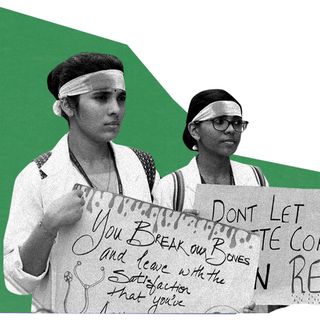43-year-old weightlifter Laurel Hubbard will create history by becoming the first transgender athlete to compete at the Olympics Games — after New Zealand picked her for participating in the women’s team at Tokyo 2020.
Hubbard transitioned in 2013 and has previously competed in world championships including the Commonwealth Games, and will now take part in the women’s super heavyweight category in the weightlifting competition in August. The decision has revived debate about gender identity, inclusivity, and fairness in sports — rivals say that she will have an unfair advantage as she went through male puberty, while others hail it as a win for inclusivity.
The International Olympic Committee, the governing body for the Olympics, changed its guidelines in 2015 to allow trans athletes to participate. The current guidelines say athletes who transition from male to female are allowed to compete without requiring surgery to remove their testes, if their total testosterone level is below a certain level.
Although Hubbard meets these guidelines, some people have still raised objections.
“A number of scientific papers have recently shown people who have undergone male puberty retain significant advantages in power and strength even after taking medication to suppress their testosterone levels,” The Guardian noted.
However, experts also note that testosterone is just one of the many factors that affect sporting ability. “If you give a person testosterone, society considers it a performance enhancer,” Sara Chodosh wrote in Posci. “Despite all the debate, though, there hasn’t been much of any conclusion about what the science actually says about testosterone’s effect on women’s athletic performance. And that’s for a good reason: there isn’t much conclusive evidence at all.”
“The truth is there are many other factors, from other hormones to societal conditioning, might boost athletic performance, making it difficult to pinpoint exactly what testosterone does for athletes.”
Related on The Swaddle:
All the Arguments You Need: To Prove It’s Fair for Trans, Intersex Athletes to Compete in Consistence With Their Gender Identity
Arguably, the inclusion of trans athletes and the purported ‘disadvantage’ against ciswomen is more than a physiological argument. There are other things like equity and fairness within the sports arena at stake. “We acknowledge that gender identity in sport is a highly sensitive and complex issue requiring a balance between human rights and fairness on the field of play,” New Zealand Olympic Committee chief executive, Kereyn Smith, said.
An international review of 31 sporting policies by Loughborough University had previously concluded: “After considering the very limited and indirect physiological research that has explored athletic advantage in transgender people, we concluded that the majority of these policies were unfairly discriminating against transgender people, especially transgender females by overinterpreting the ‘unsubstantiated belief’ that testosterone improves athletic performance.”
Other studies have advocated for mixed-gender sports teams — one of the benefits of which is greater accessibility for transgender people.
As Pallavi Prasad noted for The Swaddle: “…sports isn’t ‘fair.’ It never was. Genetics isn’t either. Many elite athletes are genetically blessed in a way the average person isn’t… Privilege isn’t fair either — athletes of color are at a disadvantage when it comes to exposure, opportunities, and resources to even begin pursuing sports competitively, compared to Caucasian athletes.”
“So, what is this ‘level playing field’ argument but a myth spun by those allowed to play and win in the field, to maintain the status quo?”




